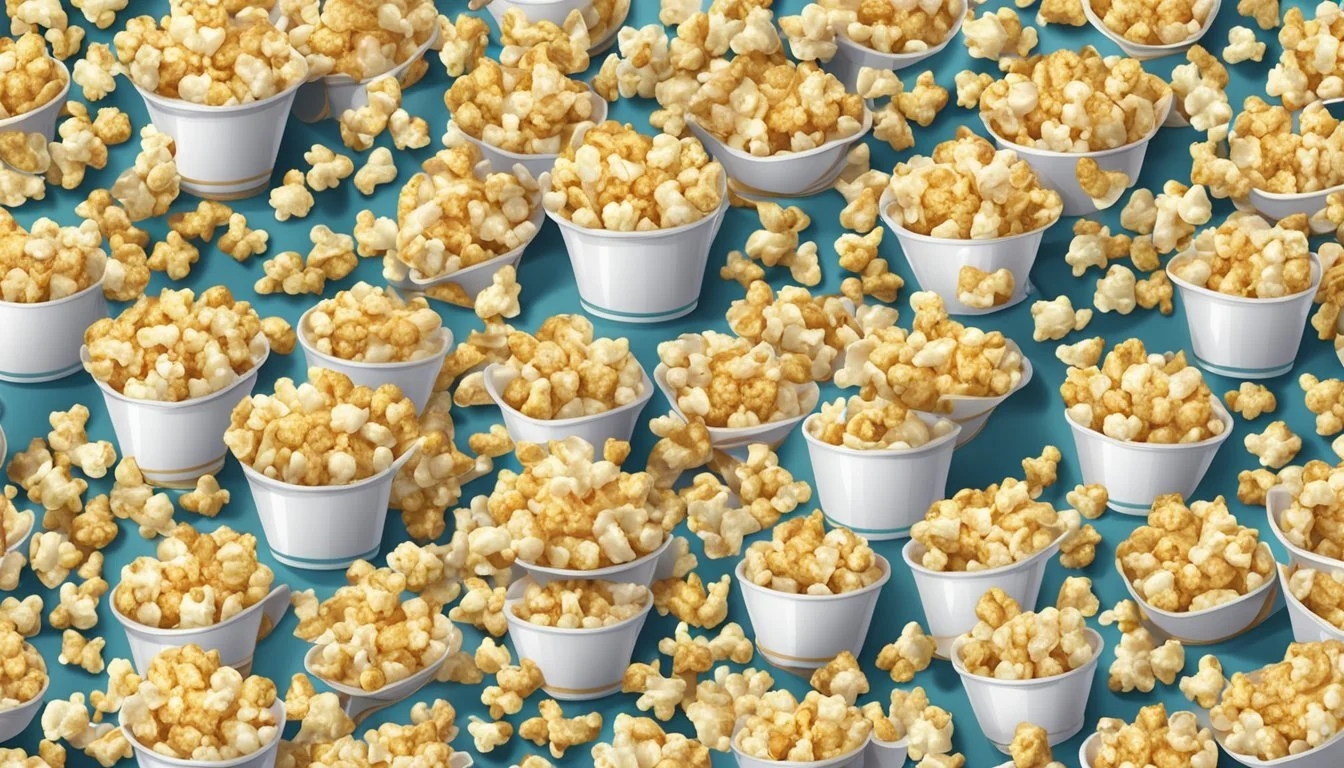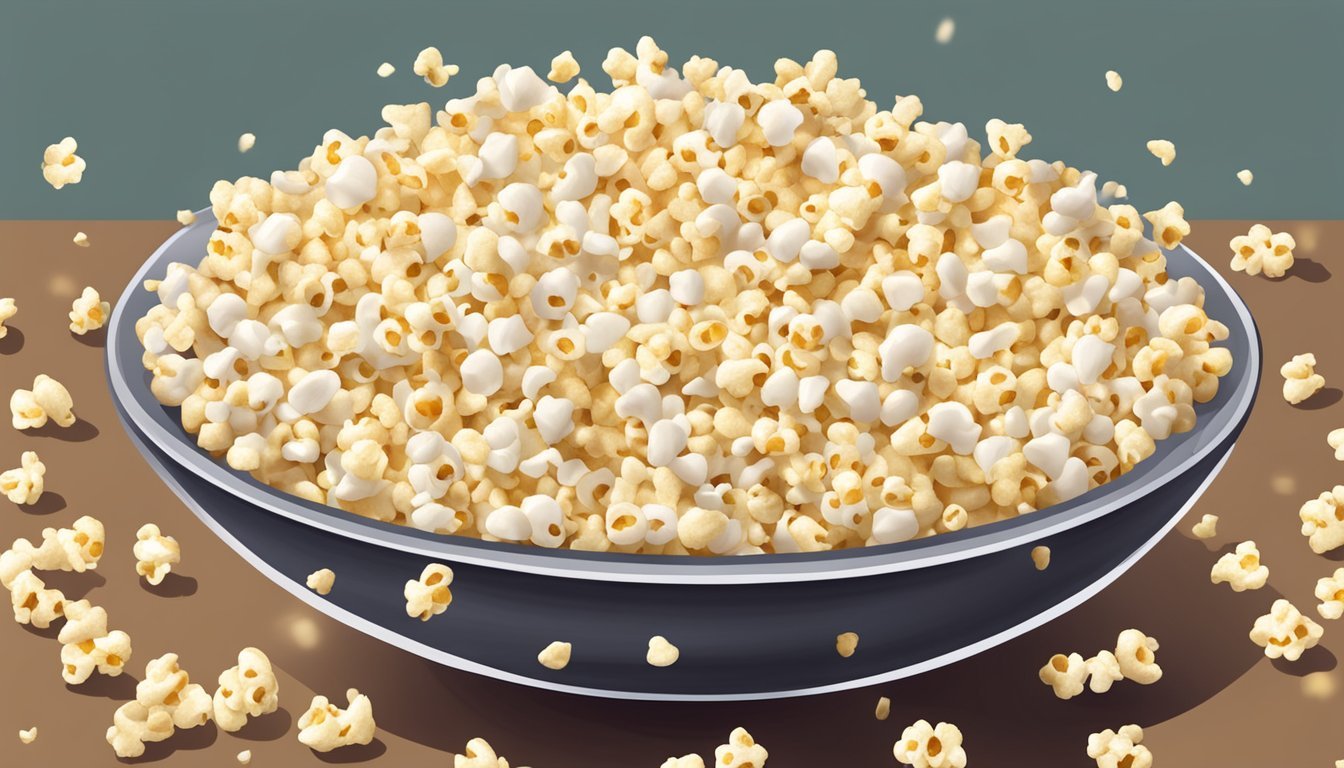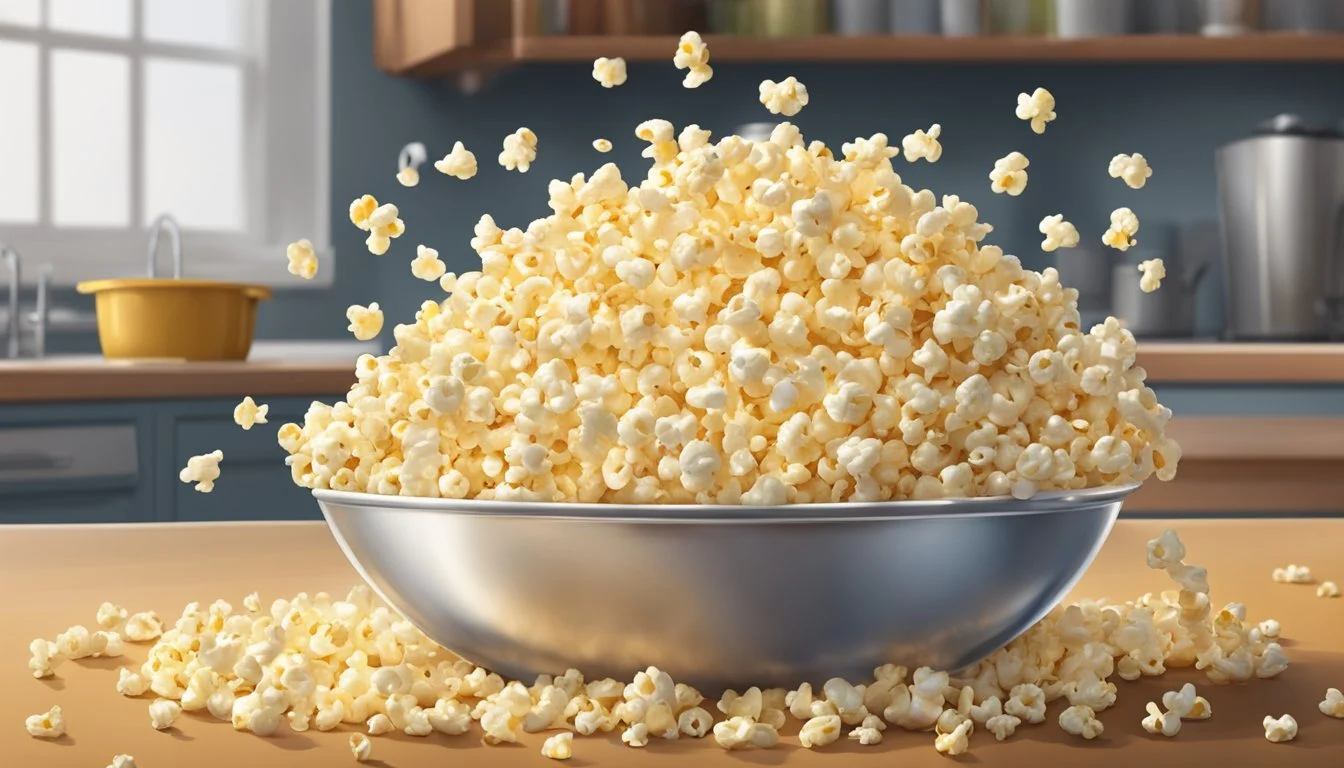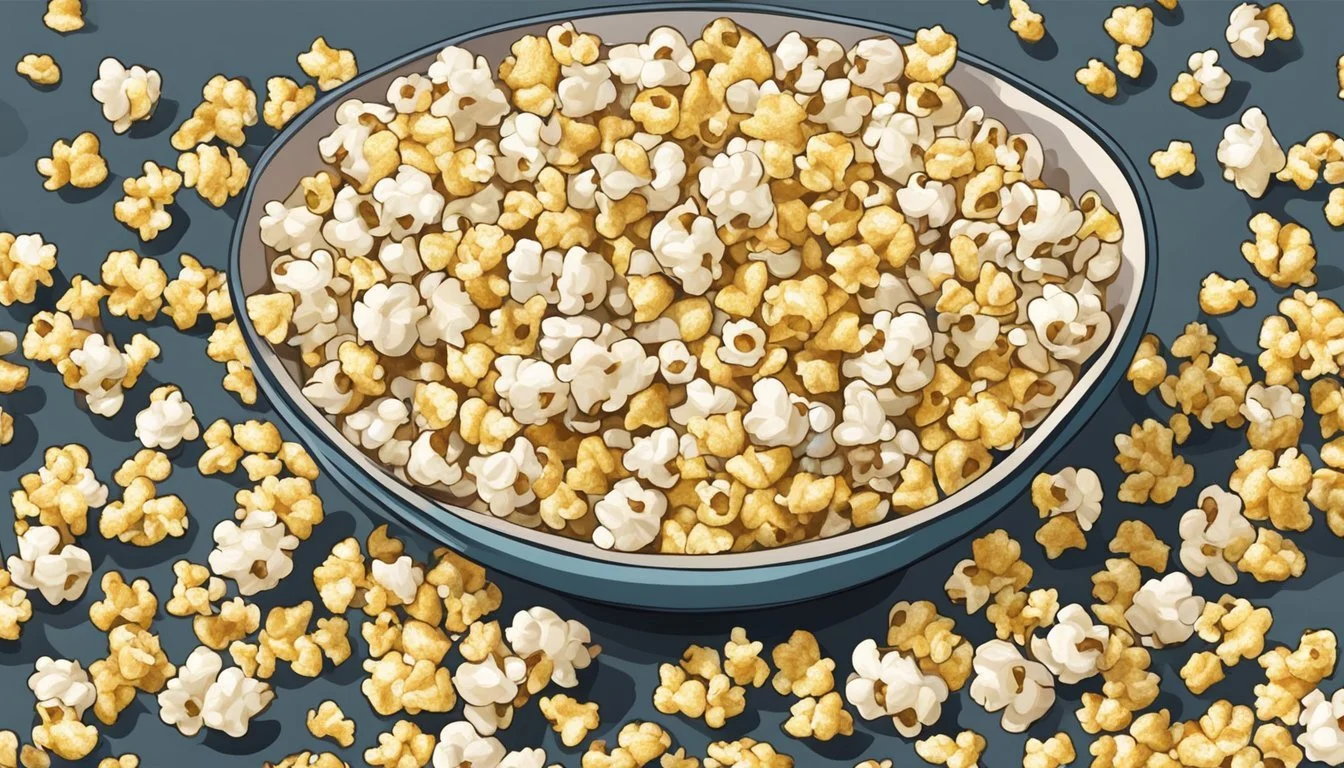How Many Cups of Popcorn Per Day Is Too Much?
Understanding Healthy Portion Sizes
Popcorn is often regarded as a healthier snack alternative due to its whole grain status, fiber content, and low calorie count when air-popped. Regular consumption of popcorn can contribute to one's daily intake of whole grains and dietary fiber, especially when it is prepared without added fats and sugars. However, like all foods, there are limits to how much one should consume to maintain a balanced diet.
The exact amount of popcorn considered too much can vary depending on an individual's overall diet and health goals. The Center for Science in the Public Interest notes that a small movie theater popcorn can range from 8 to 11 cups, and this is often laden with additional fats and salt. In contrast, air-popped popcorn contains significantly fewer calories and is lower in fat. For those integrating popcorn into their daily snacking habits, being mindful of portion sizes and preparation methods is crucial to ensure it remains a healthy addition to their diet.
Consumers may find that sticking to a serving size similar to the recommended 3 cups of air-popped popcorn, which contains about 93 calories and 3.6 grams of fiber, can be both satisfying and beneficial. This modest portion helps in feeling full for a more extended period due to its high fiber content, while also keeping calorie count low. As with any dietary choice, moderation is key, and it's essential to balance popcorn consumption with other nutritional needs.
What is Popcorn?
Popcorn is a whole grain snack known for its high fiber content, and it serves as a source of carbohydrates and protein. It is considered a popular treat, commonly associated with movie-going experiences, and has a range of nutritional benefits when prepared healthily.
Nutritional Profile of Popcorn
Popcorn is essentially a type of corn kernel that expands and puffs up when heated. From a nutritional standpoint, it is a whole grain, meaning it contains all parts of the grain kernel: the bran, germ, and endosperm. Here's a brief outlook on its nutritional content per 3 cups of air-popped popcorn:
Calories: 93 kcal
Protein: 3 grams
Carbohydrates: 18.6 grams
Dietary Fiber: 3.6 grams
Sugar: 0.2 grams
Total Fat: 1.1 grams
Popcorn provides a good dose of dietary fiber which is essential for digestive health. It also contains antioxidants and is low in sugar, making it a potentially heart-healthy choice. Plus, as a whole grain, it contributes to the intake of essential vitamins and minerals, though the exact amounts can vary.
Types of Popcorn
There are various methods of popping corn, each affecting its nutritional value:
Air-Popped Popcorn: This method involves heating the kernels through the circulation of hot air, resulting in a low-fat popcorn since no oil is used in the process.
Microwave Popcorn: Packaged in convenient microwaveable bags, this type often contains added fats and flavorings that can alter the nutritional profile.
Stove-Top Popcorn: Popped in a pot on the stove, typically with oil, this type can vary greatly in terms of added calories and fat based on the amount and type of oil used.
Theater Popcorn: Usually cooked in coconut oil and topped with butter, this variety is significantly higher in calories and fat compared to air-popped popcorn.
Choosing air-popped popcorn and controlling the added toppings can help maintain its nutritional benefits.
Health Benefits of Popcorn
Popcorn, when prepared healthily, serves as a beneficial snack packed with nutritional elements. It not only complements the diet with its high fiber content but also provides antioxidants that aid in disease prevention.
Dietary Fiber and Digestive Health
Fiber Content: Popcorn is a rich source of dietary fiber. A typical serving of 3 cups of air-popped popcorn contains approximately 3.6 grams of fiber. Fiber is crucial for maintaining a healthy digestive system, as it supports bowel regularity. Adequate fiber intake is also linked with promoting gut health and may contribute to the prevention of digestive disorders.
Gut Health: By supporting the growth of beneficial bacteria in the digestive tract, fiber from popcorn can improve overall gut health.
Antioxidants and Disease Prevention
Antioxidants in Popcorn: Popcorn contains compounds called phenolic acids, a type of antioxidant. These antioxidants help to protect the body's cells from damage caused by free radicals, potentially reducing the risk of chronic diseases like cancer and heart disease.
Heart Disease and Blood Pressure: The fiber in popcorn contributes to heart health by helping to lower levels of LDL cholesterol, known as "bad" cholesterol. This, in turn, may aid in reducing blood pressure and inflammation, further preventing heart disease.
Risks and Concerns
When consuming popcorn, especially in significant quantities regularly, it's crucial to be aware of the potential health risks associated with its components, such as saturated fats, sodium, and added chemicals. These elements can contribute to various health issues, particularly when one exceeds recommended daily intake levels.
Saturated Fats and Heart Disease
Popcorn itself is a whole grain and can be a healthy snack. However, the manner in which it is prepared and served can dramatically alter its nutritional profile. Movie theater popcorn and many microwave varieties tend to be high in saturated fats due to the butter or butter flavoring used. Saturated fats are known to raise LDL cholesterol levels, which can contribute to heart disease and inflammation. It's advisable to consume these types of popcorn in moderation.
Sodium and Blood Pressure Issues
Sodium content in popcorn can vary significantly. Pre-packaged or movie theater popcorn often contains high levels of sodium, which can exacerbate high blood pressure. The FDA recommends a daily sodium intake of no more than 2,300 milligrams, yet some theater popcorn servings can contain more sodium than this daily limit. Regular consumption at these levels can increase the risk of strokes and heart disease due to elevated blood pressure.
Additives and Chemical Exposure
Commercially prepared popcorn may include various additives and chemicals. One such chemical is diacetyl, used in artificial butter flavoring, which has been linked to respiratory issues known as "popcorn lung" when inhaled in large quantities. Additionally, PFOA, a chemical previously used in the lining of microwave popcorn bags, has been associated with several health issues. Although many manufacturers have phased out PFOA, it's worth considering potential chemical exposure when choosing popcorn products.
How Much Popcorn Is Too Much?
Determining the appropriate popcorn intake hinges on understanding its caloric impact and aligning consumption with dietary guidelines.
Caloric Intake from Popcorn
Popcorn can be a healthy snack with a relatively low-calorie count, primarily when air-popped, which contains about 31 calories per cup. However, the addition of butter or sugar significantly heightens the caloric content. For example, movie theater popcorn can reach up to 1,090 calories per tub, which can be a substantial fraction of an individual's daily caloric needs. The American Heart Association recommends that snacks should not exceed 100-150 calories for women and men, respectively, suggesting a modest serving size aligned with an individual's daily calorie targets.
Serving Size Recommendations
Standard serving sizes for snacks like popcorn typically range around 1-3 cups, which aligns with many nutritional guidelines. The Centers for Disease Control and Prevention (CDC) promotes portion control as a vital aspect of weight management. To support heart health and weight loss goals, one might consider a portion size appropriate for their dietary needs.
Air-popped popcorn serving size: 1-3 cups
Calories per serving: Approximately 31-93 (air-popped)
One must be cautious with the different serving sizes available, especially in movie theaters where a small size can range from 8-11 cups, and a large might reach 20 cups or more. Consuming large quantities regularly can lead to excessive caloric intake, potentially hampering weight loss efforts and leading to other health concerns.
Making Healthier Popcorn Choices
When selecting popcorn as a snack, one's health can benefit from considering the preparation method and the chosen toppings. These aspects significantly influence the nutritional value and caloric content of popcorn.
Air-Popped versus Microwave Popcorn
Air-popped popcorn is widely recognized for being the healthier choice. Without the need for oil, air-popped popcorn offers a low-calorie, high-fiber snack. By contrast, microwave popcorn typically contains added fats and chemicals that can increase calories and may have potential health risks.
Air-Popped
Calories: Approximately 30 calories per cup
Fat: Negligible unless extra toppings are added
Preparation: Uses hot air, no added substances required
Microwave Popcorn
Calories: Higher due to added oils and butter
Fat: Can be significant, especially in 'extra butter' or 'movie theater-style' varieties
Preparation: Involves added flavors and preservatives
Healthy Toppings and Additions
Choosing healthy toppings for popcorn can enhance its taste without compromising on nutrition. Here are some recommendations:
Olive Oil or Avocado Oil: Rich in healthy fats, just a drizzle can elevate the flavor.
Nutritional Yeast: Offers a cheesy flavor with added vitamins and minerals.
Herbs and Spices: Such as paprika, garlic powder, or dill can add complexity without extra calories.
Cinnamon: A sprinkle provides sweetness without sugar.
Toppings to limit:
Butter: High in saturated fat, should be used sparingly if at all.
Salt: Excess salt can lead to increased blood pressure, moderate use is key.
Creative Popcorn Recipes
Crafting homemade popcorn with a variety of flavors can add a delightful twist to this whole-grain snack, making it both enjoyable and a fitting inclusion in a balanced diet.
Homemade Popcorn Flavors
Caramel Popcorn: One can prepare a classic caramel popcorn by boiling a mixture of sugar, butter, and corn syrup for a minute before pouring it over air-popped popcorn. This creates a sweet glaze that is irresistible.
Recipe Snapshot:
Ingredients: 8 cups air-popped popcorn, 6-ounce packet of Jell-O, 2 cups sugar, 1 stick butter, 1 tablespoon corn syrup
Preparation: Spread popcorn on a sheet, boil the mixture, pour over popcorn, stir to coat.
Cheese Popcorn: By sprinkling grated cheese and a pinch of salt over freshly popped kernels, one can quickly create a savory homemade popcorn variant that can serve as a healthier snack option.
Cinnamon Churro Popcorn: This recipe offers the flavors of a churro without the deep-frying. Toss air-popped popcorn in a cinnamon-sugar mixture to achieve a sweet and spicy profile.
Tips: Use clarified butter when coating popcorn to avoid sogginess; shake the pot during popping to cook kernels evenly.
Popcorn Inclusion in Balanced Diet
Incorporating popcorn into a balanced diet is simple due to its status as a fiber-rich whole-grain. To ensure it remains a healthy snack, it's key to be mindful of preparation methods and toppings. Homemade popcorn can be seasoned with a minimal amount of healthy oils, while avoiding excessive sugary or fatty toppings.
Balanced Snack Ideas:
Pairing popcorn with vegetables such as sliced cucumbers or cherry tomatoes can enhance the nutrient profile.
Adding nuts to popcorn provides healthy fats, fiber, and protein, turning it into a sustaining snack.
Pro Tip: Keep portion size in check to ensure caloric intake aligns with a balanced diet. Moderation is always critical, even with healthier homemade popcorn recipes.
Conclusion
When considering popcorn consumption, moderation is key. An appropriate serving size varies based on individual dietary needs, but generally, three cups of air-popped popcorn provide a balance of calories, fiber, and negligible fat without excessive sodium.
Experts suggest that 20 cups of popcorn might be the upper limit when considering health goals. High calorie and sodium counts in movie theater popcorn warrant caution. One could potentially consume more than the FDA's daily recommendation of 2,300 milligrams of sodium from a large movie theater popcorn alone.
For daily intake, individuals might benefit from sticking to smaller portions, such as eight to fifteen cups of air-popped popcorn, which provides a lower calorie snack alternative, rich in fiber, that can contribute to feelings of fullness.
Consumers should be wary of adding calorie-rich toppings like butter or sugary coatings which can quickly escalate the calorie content. Homemade variations, like the Jell-O popcorn recipe mentioned earlier, can also introduce significant amounts of sugar, butter, and corn syrup, which should be factored into one's daily intake.
In summary:
Three cups of air-popped popcorn can be a healthy snack choice.
Eight to fifteen cups can be consumed throughout the day if additional toppings are avoided.
Twenty cups may be considered an upper limit to avoid excessive caloric intake, especially in the case of movie theater popcorn.
Popcorn Consumption and Special Diets
When considering popcorn consumption for various diets, it's important to examine its role in weight management and diabetic diets, as well as how it fits into alternative eating plans. Popcorn is a whole grain that is naturally high in fiber and low in calories, making it a popular choice for a range of dietary needs.
Popcorn for Weight Management
Calories: One key factor for weight management is calorie intake. While plain air-popped popcorn is low in calories, around 30-35 calories per cup, it can quickly become a high-calorie snack when additives like butter, sugar, and flavorings are included.
Fiber: The high fiber content in popcorn, approximately 3.5 grams per three-cup serving, may aid in weight loss by promoting a feeling of fullness, which can reduce overall calorie consumption. Fiber can also help prevent constipation, which is a common concern in weight loss diets where food intake is reduced.
Popcorn for Diabetic Diets
Blood Sugar: Despite its carbohydrates, popcorn has a relatively low impact on blood sugar when eaten in moderation. Its fiber slows down the digestion process, which in turn can help prevent spikes in blood sugar levels.
Portion Control: Diabetic diets often recommend portion control to manage blood sugar, and given that a single cup of air-popped popcorn provides a satisfactory amount of volume, it is a suitable snack option. They should, however, be cautious of pre-packaged or cinema popcorn, which may contain added sugars or excessive fat.
Alternative Diets and Popcorn
Gluten-Free and Vegan: Air-popped popcorn is naturally gluten-free and vegan, making it an inclusive snack option for individuals following these dietary restrictions. Its versatility allows for various seasonings to complement alternative diets without adding animal products or gluten-containing ingredients.
Whole Grain Nutrition: For those on alternative diets that prioritize whole food consumption, popcorn offers a whole grain advantage. Not only is it an excellent source of fiber, it contains antioxidants that are retained even after popping. However, it is important to note that a normal serving size to avoid excess calorie intake remains between eight to fifteen cups of air-popped popcorn, depending on individual health goals and activity levels.
References and Guidelines
When considering popcorn consumption, it's important to be cognizant of recommendations by reputable health organizations and existing dietary guidelines. These help ensure that the nutritional benefits of popcorn, such as dietary fiber, are balanced with an awareness of calorie and sodium intake.
American Heart Association on Popcorn Consumption
The American Heart Association (AHA) emphasizes popcorn's potential as a heart-healthy snack, mainly because of its dietary fiber content. It suggests that air-popped popcorn without added salt and butter aligns well with a heart-healthy diet. Registered dietitians often endorse the AHA's viewpoint, advising that one should read nutrition labels carefully to keep track of sodium and added fats.
Dietary Guidelines for Popcorn Intake
The Dietary Guidelines for Americans do not specify an exact serving size for popcorn. However, they do recommend that adults consume at least 25 to 30 grams of dietary fiber per day depending on age and sex. Given that a typical serving of popcorn contains around 1 gram of dietary fiber per cup, consumers can use this as a guide to moderate their intake. Nutritional benefits such as fiber are maximized when popcorn is prepared without excessive butter or salt, which align with both the AHA's advice and information presented on nutrition labels.
Popcorn in Culture and History
Popcorn has held a notable place in American culture, particularly in its association with movie theaters and having historical roots stretching back centuries.
Popcorn's Role in Movie Theaters and Events
Movie Theater Popcorn: The tradition of popcorn at movie theaters began during the Great Depression when its affordability made it a popular diversion. The relationship between popcorn and movie theaters has since become iconic, creating a shared cultural experience. Patrons often expect the sensory experience of warm, buttered popcorn as part of their movie-going ritual.
Historical Significance of Popcorn
Cultural Significance: Popcorn has been a part of festivities and events since the late 19th century. It gained prominence in American culture, securing its place at various social gatherings beyond movie theaters, such as circuses and fairs. Its unique popping characteristic not only provided an audible delight but also spoke to the innovation of snack foods in American history.
Frequently Asked Questions
In this section, readers will find concise insights into the nutritional aspects of popcorn and the potential health risks associated with excessive consumption.
Nutrition Facts and Common Misconceptions
Popcorn, when prepared properly, is a high-fiber, whole-grain snack that is naturally low in calories and fat. A single cup of air-popped popcorn contains around 31 calories. However, misconceptions arise when different preparation methods significantly alter its nutritional profile. Microwave popcorn, for instance, often contains added trans fats and saturated fats, which can be detrimental to heart health if consumed in large amounts.
Common Nutritional Information for Popcorn:
Air-popped popcorn (no added butter or oil):
Calories: Approximately 31 per cup
Fat: 0.4 grams per cup, with minimal saturated fat
Fiber: About 1.2 grams per cup
Microwave popcorn:
Varies by brand, but many have added oils and flavorings
Can be high in trans fats and saturated fats
Risks of Overconsumption
Consuming excessive amounts of popcorn, especially varieties loaded with added fats and sodium, may contribute to health issues such as high blood pressure and an increased risk of heart disease. The Center for Science in the Public Interest (CSPI) suggests that a small movie theater popcorn can range from 8 to 11 cups. Using their benchmark, excessive consumption could mean eating much more than a theater's large popcorn size of 20 cups in a day.
Health Complications from Overconsumption:
High Blood Pressure: High sodium content in many pre-packaged popcorns can increase the risk.
Heart Disease: Due to high levels of saturated and trans fats in some popcorn products.
Weight Gain: Consuming large quantities of high-calorie popcorn can contribute to obesity.
Cancer Risk: Some studies have raised concerns about chemicals used in microwave popcorn bags; further research is ongoing.
Individuals should pay close attention to portion sizes and choose air-popped popcorn when possible to maximize the snack's health benefits while minimizing risks.
Appendix
In assessing whether one can have too much popcorn, it's imperative to examine the detailed nutritional profile of popcorn and the distinctive properties of its various preparations.
Detailed Nutritional Information
Popcorn's nutritional value hinges on its preparation. Air-popped popcorn is a whole grain and notably low in calories. It contains:
Calories: Approximately 30-35 calories per cup
Fiber: Roughly 1.2 grams per cup, aiding in satiety
Fat: Minimal fat, unless added through toppings
Protein: Around 1 gram per cup
Carbs: Generally 6 grams per cup, mainly complex carbohydrates
It also comprises trace amounts of minerals such as magnesium, zinc, and potassium. Popcorn may contain antioxidants like polyphenols due to it being a whole grain, contributing to its health benefits.
Popcorn Varieties and Their Properties
Movie theater popcorn tends to be higher in calories, fat, and sodium compared to air-popped popcorn, primarily due to added butter or oil and salt. For example:
Calories: Can reach up to 1,090 calories for a large size
Fat: High levels of saturated and polyunsaturated fats
Sodium: As much as 2,650 milligrams which is higher than the daily recommended intake
Popcorn can become a high-calorie, high-fat food depending on toppings like butter, caramel, or cheese—transforming it from a healthy snack into one that could contribute to dietary excesses. Nutritional yeast, a common topping, adds protein, fiber, vitamins, and minerals but should be used sparingly to keep calorie count down.
Specialty popcorns might include additional flavors and nutritional enhancements such as Vitamin K, Vitamin A, or calcium. However, the nutritional benefits can be undermined by added sugars and fats. It is essential to observe moderation and be mindful of these additional toppings and their impact on overall nutritional intake.













